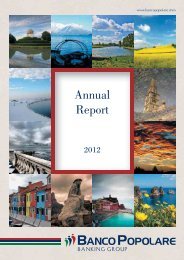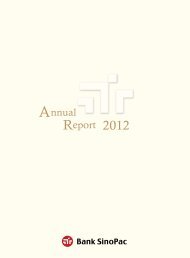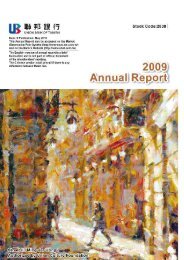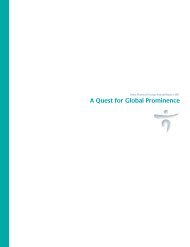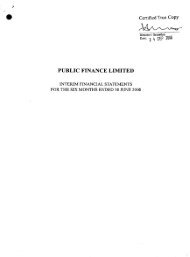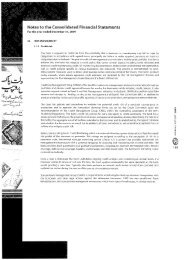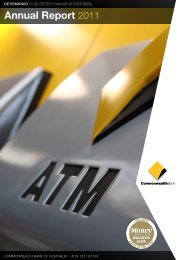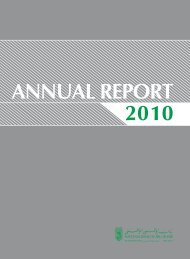Annual Report 2011 - Hong Kong Monetary Authority
Annual Report 2011 - Hong Kong Monetary Authority
Annual Report 2011 - Hong Kong Monetary Authority
Create successful ePaper yourself
Turn your PDF publications into a flip-book with our unique Google optimized e-Paper software.
Is this the end<br />
of the market economy?<br />
In 2009 GDP in the industrialised countries shrank 3.7%,<br />
marking the worst recession since 1945. In some respects<br />
it was even reminiscent of the Great Depression of the<br />
1930s. Fortunately at the global level the shock was cushioned<br />
by positive growth in the emerging economies, especially<br />
China’s (illustrating how globalisation though often<br />
harshly criticised has its advantages). The recovery that<br />
began in 2010 was greeted with relief and many observers<br />
quickly concluded that the crisis had blown over.<br />
Actually, nothing could have been further from the truth.<br />
The global economic comeback is in jeopardy. Although<br />
the United States may well avoid a double dip this year, the<br />
same cannot be said for Europe. France and Germany<br />
hope to stay ahead with growth just inside positive territory,<br />
but Italy and Spain will inexorably slide back into<br />
recession. On the face of it Euroland as a whole should<br />
see its GDP fall 0.5%, making this a “controlled” slump<br />
compared with 2009.<br />
Yet the economic environment throughout the West is far<br />
more daunting now than it was three years ago. Jobless<br />
rates are high, banks have been weakened and public<br />
finances are in tatters. Between 2007 and <strong>2011</strong> the average<br />
budget deficit in the OECD countries rose from 1.3%<br />
of GDP to 6.6%. During the same period their public<br />
debt soared from 73% of GDP to 102%. In these conditions,<br />
fiscal stimulus is now simply out of the question.<br />
Meanwhile the strain on government resources has<br />
mounted in line with unemployment, which in the United<br />
States has doubled since 2007 and grown by half as<br />
much again in the euro area, where it currently exceeds<br />
10%. Finally, the long-ignored problem of debt servicing<br />
has suddenly reared its head.<br />
Commercial banks and private investors, fearing a cascade<br />
of defaults, have dumped the sovereign bonds of the most<br />
vulnerable countries and triggered an unbearable rise in<br />
their yields. At the same time, legitimate determination to<br />
shore up the banking system has prompted authorities to<br />
demand higher capital ratios. Banks are therefore having<br />
to tap the markets to increase their shareholders’ equity<br />
even as the reputed safety of their government debt portfolios<br />
has been compromised. A tempting solution for<br />
them is to reduce their assets (i.e. loan books), depriving<br />
12 <strong>2011</strong> ANNUAL REPORT - BANQUE PRIVÉE EDMOND DE ROTHSCHILD SA<br />
companies and consumers of credit. A mood of mistrust<br />
has settled over the Continent, with lending institutions<br />
refusing to take any more risks. The interbank system has<br />
seized up, forcing the European Central Bank to move in<br />
and replace it.<br />
Keynesians and monetarists succour<br />
the global economy<br />
A series of financial crises since 1990, the year of Japan’s<br />
banking and real estate collapse, has challenged the<br />
legitimacy of the market economy. In 1937 the brilliant<br />
American economist John Maynard Keynes won widespread<br />
praise with his book The General Theory of Employment,<br />
Interest, and Money, which offered solutions to<br />
end the long slump brought on by the 1929 Crash. Keynes<br />
rejected the laissez-faire doctrine of the 18th century<br />
encapsulated in Say’s Law, positing that supply creates<br />
its own demand. He took the opposite view, preaching<br />
state intervention via public spending to get economies<br />
back on track after a major spill.<br />
This strategy, much vaunted by politicians, lost some its<br />
relevance during the stagflation of the 1970s. Rightly or<br />
wrongly it was blamed for simultaneously aggravating<br />
unemployment and inflation. So the world went back to<br />
the basics advocated first by Adam Smith and, in the<br />
1980s, by Milton Friedman and the so-called Chicago<br />
School, a modernised neoclassical approach that inspired<br />
Ronald Reagan, Margaret Thatcher and others. The fall of<br />
the Berlin Wall in 1989 helped to assert the superiority of<br />
the market economy, championed by the monetarists, over<br />
the centrally planned economy.<br />
Ben Bernanke, chairman of the US Federal Reserve, also<br />
subscribes to this view. He believes the debacle of the<br />
Dirty Thirties was brought on by a shrunken money supply<br />
rather than by the fall in investment that Keynes identified<br />
as the cause. The 2008 subprime crisis came as an excruciating<br />
trial for supply-side economics. Even today the jury<br />
is still out. US President Obama, borrowing straight from<br />
Keynes, opted for massive government expenditure when



